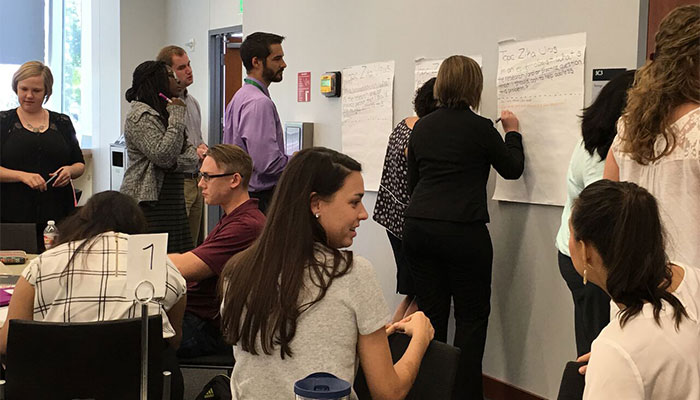New students consider public health myths, perceptions
Incoming School of Public Health graduate students were confronted recently by their perceptions of different public health concentrations and the overall field.
Prior to attending the interprofessional education event, the 47 new students were asked to complete a survey of their own backgrounds, academic concentrations, how they would rank statements about common public health assumptions, and to write words and phrases that they felt best described different types of public health practitioners.
“Warm, inviting, jovial, loving, prevention-oriented, focused on a healthy society, approachable, good listeners, big-picture people” were how students thought of Behavioral and Community Health professionals. “Serious, strict, technical, intelligent, math wizards, nerds, critical thinkers, research focused” were some assessments of biostatisticians.
Epidemiologists were viewed as “science-oriented,” people who work “overtime,” and those involved in “the disease process, data analysis/collection and surveillance investigations.”
Students described Environmental and Occupational Health Sciences professionals as being “outdoorsy, tree huggers and one with nature,” focusing on environmental issues like air quality, pollution, infectious disease, healthy drinking water, landfills, workforce hazards and occupational health.
Health Management and Policy professionals, on the other hand, were labeled as “leaders, change agents, business and policy oriented.” One comment described them as having the “largest form of control over public health.”
“In any field, it’s important to know how to work together with people who are different and come from backgrounds other than our own,” said Karen Bell, PhD, Assistant Professor and Director of the UNTHSC Department of Behavioral and Community Health. “Especially in community health, we find solutions in unique ways through collaboration with others. Each perspective brings something important to the table.”
The event pushed students to think beyond their initial perceptions and look at public health in a broader way.
“When you graduate, you’ll be working with many people across professions and within communities – even the word community can have different applications, whether it’s a neighborhood, city, county or state, even a country,” said Assistant Professor Marcy Paul, PhD, who along with Dr. Bell presented the IPE event.
“So think on a larger scale than your own ‘world,’ because people representing varied backgrounds, experiences, even cultures, are all part of the larger public health community.”





Social media